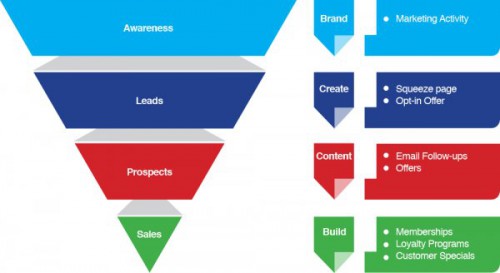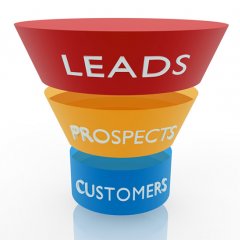With new research showing businesses having an increased focus on leads and conversion, everybody is talking about lead generation. It isn't surprising then to know that nearly 50% of B2B marketers' lead generation budgets will increase this year. (B2B Technology Marketing Community).
Lead generation is just one of the many advantages inbound marketing provokes, however, knowing how to nurture these leads and manage them successfully, isn't something businesses have necessarily considered (or budgeted for).
Businesses invest so much time producing a strategy to generate more leads, yet they don't plan for what happens when this strategy is implemented and working! Lead generation is difficult" not impossible. So once your business starts reaping the benefits of your dedication to lead generation (it will happen, honest!) " be prepared and know how to manage these leads effectively.
Sales funnel, what sales funnel?
68% of B2B organisations have not identified their funnel. (MarketingSherpa) By neglecting to do so, businesses are sometimes not even aware when they've generated a new lead. The strongest leads are filtered through the funnel and ultimately turned into positive sales. So without knowing your basic sales funnel, it's extremely difficult to recognise an opportunity for lead nurturing, enabling you to turn these leads into sales.
What do we mean by your sales funnel?

You can see from our example that the funnel is split into categories at different stages. It is important to determine which stage of the funnel potential leads are at and therefore which of these leads need managing and when. Are they simply visitors to your site, who fall under the awareness stage? Are they a marketing qualified lead (MQL) or a sales qualified lead (SQL)? And if, without identifying your sales funnel, you have managed to spot your MQLs, how then do you know which of these to prioritise in order to convert them into SQLs? Which brings me on to my next point…
Lead Triage
Lead triage is primarily for smaller B2B businesses and focuses on prioritising the leads that you have generated by reviewing them individually. For larger companies, lead scoring is adopted to decipher the value of respected leads " however, only a handful of large companies (those primarily who are overwhelmed by leads) should be implementing this strategy.
A good way to describe how leads might be managed by lead triage is by using an example of a hospital waiting room. Patients are prioritised, putting those who need immediate attention, top of the list. Similarly, the leads that need managing first (e.g. those with high value attributes or those further along the buyer's journey) are the prime focus within lead triage. Once these leads have been identified, they can then be categorised within the context of your SLA.
Service Level Agreement (SLA)
What do we mean when we refer to your SLA? We are talking about the relationship between your sales and marketing teams. It's time to make up, not break-up, as this is vital in contributing to your effective lead management strategy. Your SLA in short, outlines your marketing goal and refers to the sales activity needed to achieve it. An agreement needs to be made as to what each team is accountable for.
Don't forget the little people
Remember how we mentioned earlier that lead triage was similar to treating patients in a waiting room? Well, just because you have prioritised your most important "patients", it goes without saying that you still need to attend to the less severe cases. Nurtured leads make 47% larger purchases than non-nurtured leads. (The Annuitas Group) Your leads need to be nurtured efficiently " even the "qualified" leads are not necessarily set to buy. An effective lead nurturing approach incorporated into your lead management strategy can result in greater ROIs " and who doesn't want that, right?!

 Back to blog
Back to blog
